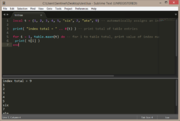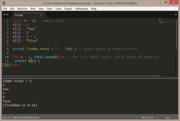Difference between revisions of "Basic lua: Tables"
From The Official Visionaire Studio: Adventure Game Engine Wiki
| Line 12: | Line 12: | ||
|- | |- | ||
| style="max-width:680px;" | <syntaxhighlight lang="lua"> | | style="max-width:680px;" | <syntaxhighlight lang="lua"> | ||
| − | local t = {1, 2, 3, 4, 5, "six", 7, "ate", 9} -- automatically assigns an index number to each value starting from 1 | + | local t = {1, 2, 3, 4, 5, "six", 7, "ate", 9} -- automatically assigns an index number to each value starting from 1 |
| − | + | local str = "" -- empty string | |
| − | |||
for i = 1, #t do -- for 1 to table total, print value of index number | for i = 1, #t do -- for 1 to table total, print value of index number | ||
| − | + | str = str .. t[i] -- add current table index value to existing text data in the str variable | |
| + | if i < #t then str = str .. ", " end -- if i is less than table entry total then insert ", " into the str variable | ||
end | end | ||
| + | |||
| + | print("table data: " .. str) -- print the table data | ||
| + | print( "table entry total: " .. #(t) ) -- print total of table entries | ||
</syntaxhighlight> || width="200px" | [[File:lb_tables_001.png|thumb|right|180px|click to enlarge]] | </syntaxhighlight> || width="200px" | [[File:lb_tables_001.png|thumb|right|180px|click to enlarge]] | ||
|} | |} | ||
| Line 29: | Line 32: | ||
local t = { | local t = { | ||
| − | [1] = 1 | + | [1] = 1, |
| − | [2] = "two" | + | [2] = "two", |
| − | [3] = 3 | + | [3] = 3, |
| − | [4] = 2 * 2 | + | [4] = 2 * 2, |
| − | [5] = "five" | + | [5] = "five", |
} | } | ||
| − | + | local str = "" -- empty string | |
for i = 1, #t do -- for 1 to table total, print value of index number | for i = 1, #t do -- for 1 to table total, print value of index number | ||
| − | + | str = str .. t[i] -- add current table index value to existing text data in the str variable | |
| + | if i < #t then str = str .. ", " end -- if i is less than table entry total then insert ", " into the str variable | ||
end | end | ||
| + | |||
| + | print("table data: " .. str) -- print the table data | ||
| + | print( "table entry total: " .. #(t) ) -- print total of table entries | ||
</syntaxhighlight> || width="200px" | [[File:lb_tables_002.png|thumb|right|180px|click to enlarge]] | </syntaxhighlight> || width="200px" | [[File:lb_tables_002.png|thumb|right|180px|click to enlarge]] | ||
|}{{toc}} | |}{{toc}} | ||
Revision as of 17:55, 2 September 2022
Tables are one of the features of Lua script, that make the scripting language so dynamic & easy to use, as they allow us to easily create tables, insert, remove & sort data. Tables are often comprised of arrays that usually involve keywords - or an index number - & a value. Tables can be accessed using multiple different methods.
| < | Index | > |
Creating a table
| method 1: automatically generated index values | |
|---|---|
local t = {1, 2, 3, 4, 5, "six", 7, "ate", 9} -- automatically assigns an index number to each value starting from 1
local str = "" -- empty string
for i = 1, #t do -- for 1 to table total, print value of index number
str = str .. t[i] -- add current table index value to existing text data in the str variable
if i < #t then str = str .. ", " end -- if i is less than table entry total then insert ", " into the str variable
end
print("table data: " .. str) -- print the table data
print( "table entry total: " .. #(t) ) -- print total of table entries
|
| method 2: manually created index values | |
|---|---|
local t = {
[1] = 1,
[2] = "two",
[3] = 3,
[4] = 2 * 2,
[5] = "five",
}
local str = "" -- empty string
for i = 1, #t do -- for 1 to table total, print value of index number
str = str .. t[i] -- add current table index value to existing text data in the str variable
if i < #t then str = str .. ", " end -- if i is less than table entry total then insert ", " into the str variable
end
print("table data: " .. str) -- print the table data
print( "table entry total: " .. #(t) ) -- print total of table entries
|

